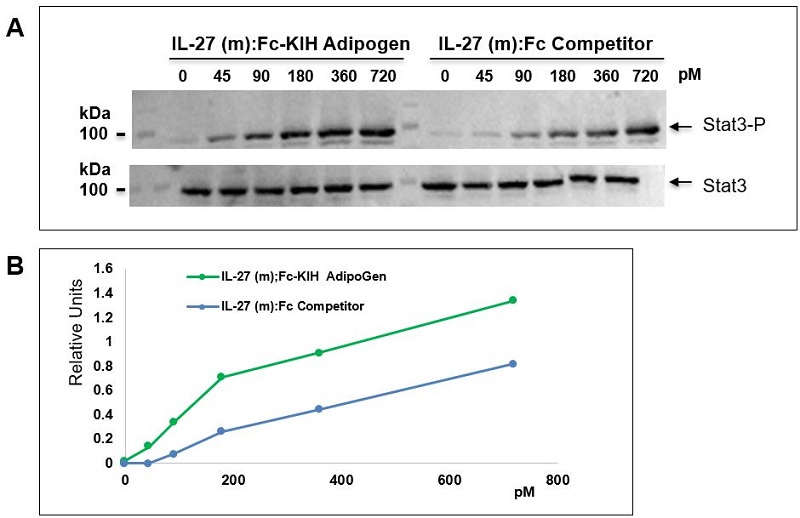IL-27 (human):Fc (human) (rec.) (non-lytic)
CHI-HF-22027
Product group Proteins / Signaling Molecules
Overview
- SupplierChimerigen Laboratories
- Product NameIL-27 (human):Fc (human) (rec.) (non-lytic)
- Delivery Days Customer2
- CertificationResearch Use Only
- Estimated Purity>98%
- Scientific DescriptionInterleukin-27 (IL-27) is a heterodimeric group 2 receptor ligand molecule that belongs to the IL-6/IL-12 family of long type I cytokines. It is composed of EBI3 (EBV-induced gene 3), a 34 kDa glycoprotein that is related to the p40 subunit of IL-12 and IL-23, and p28, the cloned 28 kDa glycoprotein that is related to the p35 chain of IL-12. IL-27 is expressed by monocytes, endothelial cells and dendritic cells. IL-27 binds to and signals through a heterodimeric receptor complex composed of WSX1 (TCCR) and gp130. Evidence suggests IL-27 interacts only with WSX-1. IL-27 has both anti- and proinflammatory properties. As an antiinflammatory, IL-27 seems to induce a general negative feedback program that limits T and NK-T cell activity. At the onset of infection, IL-27 induces an IL-12 receptor on naie CD4+ T cells, making them susceptible to subsequent IL-12 activity (and possible Th1 development). Notably, IL-12 family cytokines are both induced and inhibited by bacterial products. Microbes promote IL-27 secretion through TLR4, and also block IL-27 production via C5a induction. - Protein. The human IL-27 complex composed of the Ebi3 subunit (aa 21-229) and the p28 subunit (aa 26-243) is fused through a polypeptide linker to the Fc portion of a mutant human IgG1. Source: CHO cells. Endotoxin content: 98% (SDS-PAGE). Interleukin-27 (IL-27) is a heterodimeric group 2 receptor ligand molecule that belongs to the IL-6/IL-12 family of long type I cytokines. It is composed of EBI3 (EBV-induced gene 3), a 34 kDa glycoprotein that is related to the p40 subunit of IL-12 and IL-23, and p28, the cloned 28 kDa glycoprotein that is related to the p35 chain of IL-12. IL-27 is expressed by monocytes, endothelial cells and dendritic cells. IL-27 binds to and signals through a heterodimeric receptor complex composed of WSX1 (TCCR) and gp130. Evidence suggests IL-27 interacts only with WSX-1. IL-27 has both anti- and proinflammatory properties. As an antiinflammatory, IL-27 seems to induce a general negative feedback program that limits T and NK-T cell activity. At the onset of infection, IL-27 induces an IL-12 receptor on naie CD4+ T cells, making them susceptible to subsequent IL-12 activity (and possible Th1 development). Notably, IL-12 family cytokines are both induced and inhibited by bacterial products. Microbes promote IL-27 secretion through TLR4, and also block IL-27 production via C5a induction.
- Storage Instruction-20°C,2°C to 8°C
- UNSPSC41116120
- SpeciesHuman


